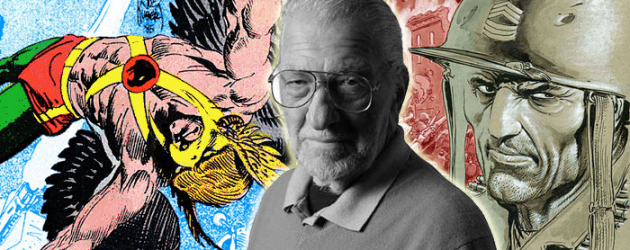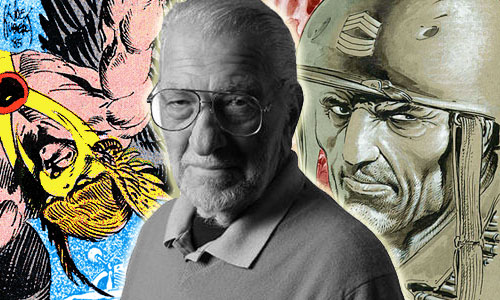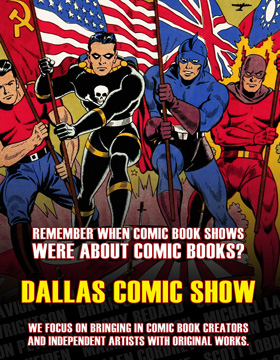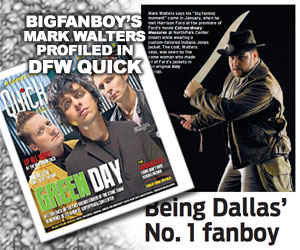I honestly don’t know if I was the last interview Joe Kubert ever did, but I can tell you I was heartbroken yesterday evening upon hearing the news that he had passed away at 85 – three weeks before his 86th birthday. For those unfamiliar with the man, Kubert is known in the comic book industry for memorable work on SGT. ROCK (which he co-created with Robert Kanigher) and HAWKMAN at DC Comics, but was still working and producing amazing visuals long after reaching an age at which most men would have retired. His newest project was called “Joe Kubert Presents” at DC, a six-issue anthology series that is scheduled to premiere October 31, 2012. Joe had won and was nominated for several industry awards, including the Alley Awards, National Cartoonist’s Society, and both the Harvey and Eisner Awards – he was inducted in the Harvey Awards ‘Jack Kirby Hall of Fame’ in 1997, and the ‘Will Eisner Comic Book Hall of Fame’ in 1998. But perhaps his greatest achievement was founding The Kubert School in 1976, giving aspiring comic book creators a place to hone their craft, all while under the instruction of accomplished professionals. Joe has two accomplished comic book creators for sons, Andy and Adam Kubert, who worked with their father at the school.
I had the pleasure of meeting Mr. Kubert about two months ago, and was able to interview the man as well. This was done at a convention the day after he participated in a candid Q&A session. I guess I shouldn’t have been surprised, but was nonetheless happy to discover that Joe was an incredibly kind man and almost always smiling. He enthusiastically met with fans and signed books, shirts and more. We talked about him possibly coming to Dallas for a Dallas Comic Con event, and I was hoping we could work it out this year. I had intended the following interview to run around the same time as Kubert’s new DC books made their debut. When I received the news yesterday, I figured now was the time to post this. My only regret was not talking with him longer, and the only reason I cut it short was because fans were waiting to meet the man, and I didn’t want to be the cause of any delay. Below is a transcription, word for word, of our interview. I must express my sincere gratitude to The Kubert School staff for allowing me to not only meet one of my heroes, but also have an interaction I’ll never forget.
1926 – 2012
Mark: So I’m sitting here with the legendary Joe Kubert, and it’s not often – honest to God, I do a lot of these types of interviews and it’s not often I get to talk to somebody that I really consider to be like a personal hero – so from me to you, first of all thank you for doing this, and thank you for coming to Houston and talking to the fans.
Joe: My pleasure, it’s been great so far. Great.
Mark: It seems like… we were just talking a second ago about how you were saying everyone’s been very nice and everything… now I know you’re a guy that spends a lot of time up in the New York areas, so coming down here to a place like Texas, the fans, it is kind of a different world, wouldn’t you say?
Joe: Well, yes and no, people here are extremely friendly and outgoing, their warmth kind of knocks you right off your feet. It’s great. People are very, very kind, and I’m having a great time… having a great time.
Mark: Now it was funny, yesterday I was listening to your talk about War comics, and Ricky Evans with Bedrock City brought up an interesting point which is a lot of people try to credit people like Neal Adams and things like that for sort of changing the face of the comic industry, but it was really your comics and the War comics that came along at that time that I think kind of reshaped how we look at comic books. I think everybody thought of comic books as being kind of superhero fare and things like that, and you kind of introduced this whole layer to what the comic book industry was at that time.
Joe: Well, that may or may not be true, I really don’t know and I’d be the last one in the world to really be able to guage that. I had no concept, no idea of any world-shaking changes that were taking place, but I’ve been lucky enough to be busy, people seem to like my work and seemed to like the kind of effort I was putting out. And the guy who really, as I said before in the other interview (referring to the Q&A), the guy who really did it, the guy who was really outstanding who pointed me in the right direction was Bob Kanigher.
Mark: Right.
 Joe: Bob was the writer and editor who put all the basics together, created the character mentally and emotionally, and wrote about him, his drive and what he should be. He and all the other characters that he had done was great, it was a great pleasure for me and a great chance for me, a great opportunity, and I was lucky enough to take advantage of it.
Joe: Bob was the writer and editor who put all the basics together, created the character mentally and emotionally, and wrote about him, his drive and what he should be. He and all the other characters that he had done was great, it was a great pleasure for me and a great chance for me, a great opportunity, and I was lucky enough to take advantage of it.
Mark: Yeah, well that’s something I really respect about you too is that you’re very quick to give credit where credit is due, because as much as you are influential to many people in this industry and in the art community, you know, you always point out Bob’s work and you always point out the other artists you worked with at the time. We were talking about Russ Heath and the whole love/hate relationship that you guys had together and everything. (laughter)
Joe: Not hate, not hate at all. I recognize his faults as probably he recognizes mine. And because of that we get along very, very well.
Mark: Yeah, I loved your quote about when you called him about the book being late, and you wanted to punch him right in the nose.
Joe: Yeah, yeah, yeah. I doubt if I would have… I would not have got physical with Russ. Russ is a very, very dear friend, I’ve known him probably at least 50 years, so we know each other real well, but it’s one thing to be professional, and one thing to be… when you’re in a business and certain things are expected of you, socially and personally, that’s something else, that’s a different world. And one doesn’t really share with the other. But that was fine, and that’s perfectly acceptable to me.
Mark: When you look back on the industry at the time when you were starting to do a lot of these wonderful comic books, and especially more in recent years and how many things have changed – I mean DC Comics has changed, Marvel Comics has changed, the editorial process has changed so much. What do you think are maybe some of the positives and negatives of both sides of that?
Joe: Well the positives are very apparent. There are so many amazing changes that have taken place in the last 20 years – it’s like really a completely and totally different world. At one time maybe 20 or 30 years ago, anybody who was caught reading comic books was put down immediately… that is not what you do, this is junk stuff and so on. Comic books today have taken on a respectability that nobody ever dreamed that it would have. And because of that and because of the high profile that we suddenly got, with movies and TV and all the other stuff, there’s a responsibility that comes along with it, yeah. You feed that, you feed that entertainment value, which is what they’re doing very, very succesfully, apparently. The other part of it is that it’s very difficult. I’ve always maintained that the job for the cartoonist is to tell a story.
Mark: Right.
Joe: Now there’s a mix between telling a story and doing beautiful illustrations. The illustrations and printing and color today is absolutely magnificent. Nobody, nobody ever thought that we’d be able to achieve the amount of quality in print and art that we have today. Nevertheless I think the basic need, today more than ever before… and perhaps it’s because the stuff we were doing several years ago was crude, and we had to rely on this area of storytelling more than illustration. Today they’re relying on illustration, everything is flash, everything is rendered beautifully, the color is excellent, but it’s lacking in storytelling and clarity, in a lot. There are many excellent cartoonists today who are doing both, who are achieving both, but not a helluva lot.
Mark: And I also want to talk about the school itself, because I think this is a really great service that you’ve provided for people that are aspiring artists, people that want to get into this industry. When I was in art school back in the early 90’s, they told us if you want to do comic books you’re never going to make it, there’s nothing for you to do, there’s no money in it. And we were pointing out, we were saying “Well what about this guy and what about that guy?” And so what was kind of the spark for you that made you say “You know what, I gotta make this, this is something I gotta put together for the people that want to be in this”?
Joe: Well it’s been my experience, in general… and I don’t, I don’t like to use generalities, but in general people who teach art know absolutely nothing of what it takes to be a comic book artist, a cartoonist, absolutely nothing. And I guess that’s one of the reasons they’re easy to attack because they don’t know a helluva lot about it. Comic, cartoonists, comic book business actually engenders a kind of artist that can do anything in the commercial art world. Anything. In order to be a good comic book artist, you have to know, as I said before, storytelling – you have to know the kind of media that you’re using, you have to know how to develop characters, you have to know color, you have to know basic art. You have to be able to draw the figure spontaneously without any kind of background or reference work, and you have to train yourself to be able to do that, which also enables you to get a job anywhere in the commercial art field. There are guys who come out of the school – people who come to the school bent on becoming a cartoonist, suddenly find out that there are different areas that their education is sponsored, allowing them to do things that they never even thought or knew about. Things like commercial illustration, or storyboards, animation, syndication, advertising – all of these things are part and parcel of the background of the comic book artist.
Mark: Yeah, exactly.
Joe: There are comic book artists that will come back and forth in these areas, if a job is soft here they can pick up elsewhere. There are very few people, as I mentioned before, talking about it yesterday – the only people who really know what is going on in our business and the needs of what the business has are those who are already in it.
Mark: What would you say is the most gratifying thing to come out of this process of having the school and being able to teach these people – like personally gratifying. I’m sure you have people come up to you and just thank you for the opportunity, but what would you say is the best part?
Joe: The absolutely 100% most gratifying thing to me are the result of my two sons.
Mark: Yes. (laughter) Did you ever think you’d have TWO talented kids like that?!
Joe: It’s a miracle. Absolute miracle. I cannot take any kind of credit for any of that because drawing is something… you either do it or you don’t. Nobody can push you to it. Once you’re hooked nobody can pull you away. In fact both of my sons love what they’re doing as much as I love what I’m doing, and we have that kind of intercommunication, they have their studio set up at the school, we see each other every day, look at each other… I mean how lucky can you get.
Mark: Yeah that’s great.
Joe: It’s terrific.
Mark: Well congrats on that, and I also want to point out you have a new mini-series coming out, is it in August?
Joe: Well they keep telling me…
Mark: New SGT. ROCK series?
Joe: New SGT. ROCK series, by the end of this year, August or September start for 6 issues, I also have an anthology series that’s all done, that’s supposed to be coming out about the end of the year too – I’m busy. Thank God I’m busy.
Mark: Hey man, as long as you can do it keep doing it. Thank you Joe, it’s a pleasure – thank you very much.
Joe: Thank you.











This is great, Mark! I always try to say “hi” to you at your shows. I hope that maybe Adam or Andy Kubert could make it to Fan Days, if they are able this fall.